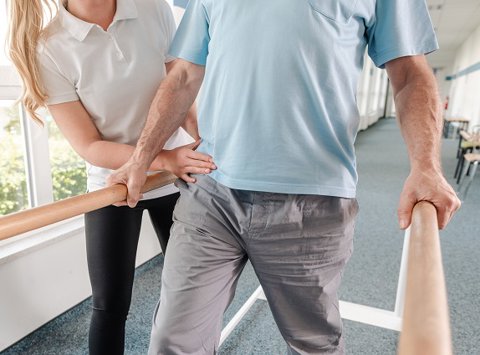
Matthew Trusch
Head of Personal Injury
Have you been injured in an accident that wasn’t your fault? You may be entitled to compensation – we’re here to make it happen.
Suffering an injury through no fault of your own can be a life-changing experience, affecting your health, career, finances, and overall quality of life. Whether you’re dealing with physical pain, emotional stress, or mounting bills, you deserve professional legal support to help you find relief and receive compensation. Our team of personal injury solicitors is dedicated to helping you secure what you need to move forward with peace of mind.
Taking the first step can be daunting. That’s why we offer a free initial claims assessment. In this confidential consultation, a member of our experienced team will listen, answer your questions, and explain your options. This assessment provides a clear, no-obligation path forward, ensuring you understand the process and can make an informed decision.
With our No Win, No Fee arrangement, you won’t pay a penny unless we secure compensation on your behalf, giving you financial security throughout the process.
With years of experience and a robust track record, our personal injury lawyers have successfully secured millions of pounds in personal injury compensation for our clients, handling cases of all complexities.
If you want to find out if you could be entitled to compensation, get in touch for a free, no-obligation chat. Whatever the injury and whatever the cause, our team of experienced Personal Injury Solicitors is here to support you throughout your recovery, providing expert guidance every step of the way.
Fill in the form below to get in touch with one of our dedicated team members, or call our team today on: 0800 260 5010




‘Personal injury’ is the legal term for any injury or illness that was caused, or made worse, by someone else’s negligence. The effects could be physical, emotional, or both. Under UK law, if you’ve suffered an injury that wasn’t your fault, you have the right to claim compensation.
By starting a personal injury claim, you're opening a legal case against the person, business or organisation to blame for your pain and suffering. A personal injury claim can compensate you for your injuries, as well as any losses you've experienced, providing vital financial support throughout your recovery and beyond.
Personal injuries can happen at any time and to anyone. Sometimes the impact is relatively minor, but for others the accident and the injuries caused can have more serious and life-changing consequences. Speaking to specialist lawyers for personal injury claims can help you understand your rights and what can be done to put things right.
Navigating the process of a personal injury claim can feel daunting, but understanding the various types of claims can help clarify whether you may be entitled to compensation and what your legal options are.
At Simpson Millar, we handle a wide range of personal injury claims that occur in many different circumstances, including:
Simpson Millar offers services on a No Win, No Fee basis, ensuring that financial concerns do not hinder your pursuit of justice. Find out if we can take on your case on a No Win, No Fee basis.
Your Solicitor must prove, on a balance of probabilities, that the other party was at least partly responsible for your injuries. This can be due to something they did or something they failed to do.
This means collecting evidence that shows how their negligence caused your injury or illness, as well as proving the other damages you’ve suffered as a result.
The success of a personal injury case hinges on building a strong case, so we’ll gather evidence to prove that another party was responsible for causing your injuries.
Relevant evidence can include medical records, documenting the nature and extent of your injuries, and establishing their direct impact on your life.
You can also present evidence of any expenses incurred as a direct result of your injuries, such as lost wages or additional medical costs.
To help your claim move forward smoothly, you’ll likely need to allow your solicitor access to your medical records and, if needed, attend an independent medical assessment.
This may feel like a lot, but a few key steps can help make things easier:
The more complete and well-organised the information you provide, the stronger your case will be, giving you the best chance for a successful outcome.
If you’ve suffered injuries and another person or organisation was at fault, or partially at fault, it’s likely you are eligible to make a personal injury claim.
Some personal injury incidents are the result of a combination of factors, making fault less clear cut. However, even if you feel you may have been partially responsible, it’s possible that another party also shares some of the blame and you may still be entitled to claim compensation.
The best way to find out if you could make a claim is to contact us for a free, no-obligation chat. Speaking to our team can help you know where you stand, what your options are and what the possible outcome could be, helping you to make a fully informed decision.
Starting a claim is straightforward with our support. We handle everything, from gathering evidence to negotiating with the other side, so you can focus on recovery.
We offer a free, initial expert claims assessment with a member of our trusted team. This is an opportunity to tell us in your own words what you’ve been through and how it’s affected your life, so we can begin to form a plan that will secure the best possible outcome for you. During this first conversation, we’ll clearly outline the process and next steps, ensuring you know exactly what to expect from the very beginning.
We know that starting a legal process can feel overwhelming. You might be unsure how personal injury claims work, or question whether you are eligible for compensation, but we’re here to guide you through from beginning to end.
Once you speak to our advisors, it's up to you if you choose to go ahead from this point. If you do, one of our specialist personal injury solicitors will take your case from there.
Not sure how to make a personal injury claim? With Simpson Millar, it's simpler than you might think. It all starts by calling 0800 260 5010 – or by requesting a callback for a time that's more convenient for you.
The time it takes from start to end varies. It depends on factors such as:
Simple cases may be resolved within a six months, whilst more complex claims could take longer. No matter how long the process takes, we’ll be here to support and update you every step of the way, working hard to achieve results as quickly as possible
If the other party admits liability, you may also be eligible for an interim payment before the case concludes, providing you with some financial help before your claim is fully settled.

Evidence is critical to making a strong claim. Thorough investigation and evidence gathering can prove fault and build a solid foundation for your claim. our team have vast experience in gathering and organising evidence relevant to a claim which could include:
You usually have three years to start your claim.
In a lot of cases, this three-year time limit starts from the date of your accident. If your injury or illness isn't known about straight away, however, the time limit will start when you're diagnosed.
It could also be up to three years after you learn that someone else caused your injury or illness.
There are exceptions. For example, for individuals with diminished mental capacity the time limit may not apply, and children have until their 21st birthday to make a claim.
It's generally better to get in touch as soon you think you may have a claim. This gives your personal injury solicitor the best chance of building a strong case whilst evidence is more readily available and fresher in people's minds.
Most personal injury claims in the UK don't go to Court. In fact, 99% of personal injury claims are settled out of court. We will explore and encourage all other options for you before it gets that far, including mediation and round-table settlement meetings.
Even if the other party challenges your claim and the Court process is started, it doesn't mean it will end up in Court. We could still negotiate a settlement before the hearing date comes around.
In the unlikely event that your claim does go to Court, our skilled personal injury solicitors will fight to get the best possible outcome on your behalf. It's also unlikely that you'll be asked to appear in Court. If you are, however, we will support you throughout.
Personal injury claim payouts are typically covered by the other party’s insurance company. We handle all communications and negotiations with insurers to secure the best outcome for you.
Some people worry that making a claim against an employer or someone they know might put a financial strain on them. However, this is rarely the case. Employers and most other parties are legally required to have insurance to cover any injury claims made against them.
The compensation you can claim depends primarily on the nature and severity of your injuries and how they affect your daily life. Generally, the more serious your physical or psychological injuries, the higher the compensation you may be entitled to.
Compensation is designed to cover both General Damages and Special Damages:
Together, these ensure that both your personal suffering and the financial impact of the accident are fully addressed.
Our expert lawyers will pursue all possible compensation on your behalf to ensure your payout factors in every aspect of your accident and it’s impact on you.

In the UK, many people decide to claim compensation after being injured due to an accident which was someone else’s fault. In law, this is called a Personal Injury Claim. The most common of these accidents include road traffic accidents and accidents at work.

Yes. Sports clubs are responsible for making sure that any visitors to their premises are reasonably safe, and the club also has a duty of care to its employees. That means anyone either visiting or working at a sports club could claim compensation if they’re injured and believe it’s because the sports club was negligent in some way.

Horse riding is a popular hobby and sport but accidents can happen, no matter how experienced of a rider you are. While many situations can be out of your control, if you’re seriously injured in a horse riding accident, and it could have been prevented by someone responsible for your safety, we could help you claim compensation.
The amount of compensation varies widely depending on the type of injury and its impact on your life.
With a wealth of experience and a long history of securing hundreds of millions of pounds for our clients, you can trust us to accurately assess your situation and determine the most fitting compensation for your unique case.
At Simpson Millar, we understand that injuries and illnesses affect individuals differently, and that's why we take a personalised approach to valuing each claim to ensure you receive what you are entitled to. We provide a personalised estimate based on similar cases, so you have realistic expectations about your claim’s value.
Yes, compensation can affect your eligibility for certain benefits. If your injury or illness forces you to give up work or take a long period of time off on reduced pay, you are entitled to get state benefits to cover lost income or help cope with a disability. However, making a claim and receiving a large compensation payout can mean that your income is deemed to be too high to qualify for these benefits.
One practical solution that can help avoid this is creating a personal injury trust. Like a bank account, your compensation can be transferred into a trust in full. It's then looked after by other people, known as trustees, in a way that works for you. By ring-fencing your damages, protecting them for the purposes they were intended, you can continue to receive state benefits.
A trust can also make sure your compensation isn't used too quickly or in the wrong ways.
You can talk to your personal injury solicitor during the claims process to find out if setting up a trust is the right choice for you. You can also read about them in more detail as part of our guide to personal injury trusts and means-tested benefits.
Yes, at Simpson Millar Personal Injury Solicitors, we offer no win, no fee claims.
This means you don’t have to pay anything upfront or risk any costs if your case is unsuccessful. With no win, no fee, financial barriers are removed, making it easier for anyone to pursue the compensation they deserve after an injury.
Some clients may already have the benefit of Before the Event Legal Expenses Insurance (BTE). This is often included in other insurance policies, such as home or car insurance, and can cover legal costs for advice and representation in the future.
If you don’t have BTE insurance, we can help arrange After the Event (ATE) insurance. This protects you from legal costs if your case is unsuccessful, covering things like court fees and the other party’s legal costs, so you can begin your claim without financial risk.
If you're unsure whether your case qualifies for no win, no fee or if you have insurance coverage in place, don’t hesitate to ask us. We’re here to help guide you through the process and make sure you have the support you need.
Choosing the right solicitors can make all the difference, and at Simpson Millar, we’re here to help. With a proven track record and a team known for both their expertise and compassion, we've secured hundreds of millions of pounds in personal injury compensation for clients just like you. Our dedication to getting the best results has earned us recognition from The Legal 500 and Chambers and Partners, two of the most trusted names in legal rankings.
Whether you’ve suffered a workplace injury or been involved in a serious accident, we have the experience to handle even the most complex cases. We’re here to support you through every step of the process, offering both practical legal advice and the care you deserve, so you can focus on your recovery.
It's not uncommon for individuals to feel uneasy about the progress of their personal injury claim with their current law firm. If you find yourself in this situation, seeking a second opinion can be a valuable step towards ensuring your best interests are protected.
Many clients have turned to us after experiencing unsatisfactory advice or service, and we take pride in achieving a seamless transition between law firms.
Before taking this step, we recommend addressing your concerns with your current legal representatives. From there, our team is committed to offering free, independent advice and guidance, allowing you to make a well-informed decision.
We will assess the specifics of your claim and quickly determine the course of action that will deliver the best possible outcome for you. If you choose to transfer your case to us, we’ll be by your side every step of the way, offering clear guidance and support to make the process as straightforward and reassuring as possible.
In some cases such as claims that have already been handled by multiple law firms it may be more challenging for us to assist. That said, we’re always happy to discuss your situation and explore whether we can help.
No Win, No Fee claims are also known as a Conditional Fee Agreements or Damages Based Agreements. They each state that if you lose your case, you won't pay legal costs.
If you win your case, the other side will cover a portion of our costs. However, you may also need to contribute to some of our fees, which would be deducted from the compensation you receive. We’ll make sure you understand any potential deductions upfront, so there are no surprises.
Do you have a motor or household insurance policy that includes legal cover? If so, you can use this to help meet any costs you need to pay when your case is successful.
Learn more about making a No Win, No Fee Personal Injury Claim with Simpson Millar.
Not sure how to make a personal injury claim? With Simpson Millar, it starts with a free, expert claims assessment.
During this initial consultation, you'll get free, confidential legal advice from our friendly advisors before you decide whether to go ahead. It's your chance to tell us what happened and how it's affecting you. We'll then explain how we can help you and what the next steps are.
It's up to you if you choose to go ahead from this point. If you do, one of our specialist personal injury solicitors will begin the process of getting you the compensation you’re entitled to.
Yes, if your employer has failed to keep you safe, you can make a claim against them.
Under UK law, all employers must have insurance to cover any potential claims, so they won't pay the compensation themselves, it'll be covered by their insurance policy.
Learn more about making an Accident at Work Claim.
No, you typically won’t have to pay tax on your personal injury payout. Regardless of the claim type or amount, personal injury compensation is usually tax-free, including any interest earned whilst your claim is ongoing.
If you’re considering investing your compensation after your case is settled, there may be tax implications to keep in mind. If any part of your compensation does require tax, your solicitor will explain why and guide you through the process.
Usually, no. We work hard to make your personal injury claim process as straightforward and stress-free as possible. The solicitor assigned to your case will handle all the complex legal work, allowing you to focus on your recovery.
Your main role will be to provide any necessary information and respond promptly. This includes signing and returning any documentation, attending medical assessments arranged for you, and keeping your solicitor updated with any new details related to your injuries or treatment. By staying engaged and responsive, you can help us move your claim along as smoothly as possible.
If you or a loved one has been injured through no fault of your own, we understand the stress and upheaval it can bring to your life. Our personal injury solicitors are here to offer compassionate support and expert guidance, helping you pursue the compensation you deserve to ease your recovery and get back on track. Contact our trusted team today for a free, initial expert claims assessment.
Fill in the form below to get in touch with one of our dedicated team members, or call our team today on: 0800 260 5010